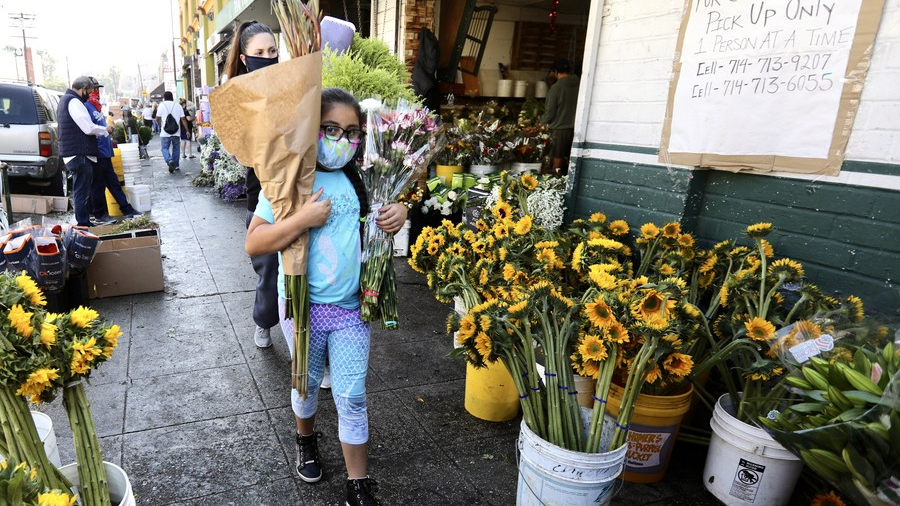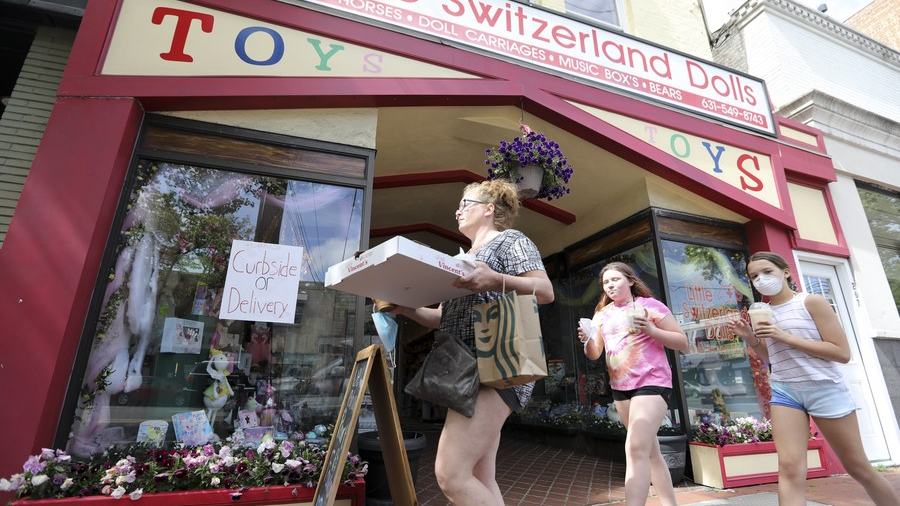
People shop at a flower market in downtown Los Angeles, California, the United States, May 8, 2020. /Xinhua
People shop at a flower market in downtown Los Angeles, California, the United States, May 8, 2020. /Xinhua
Editor's note: Yannan Collins is a consultant with a media background in the United States. The article reflects the author's opinions, and not necessarily the views of CGTN.
New daily coronavirus cases started spiking across southern U.S. states amid premature re-opening of businesses. In some areas, new infections increased by over 100 percent.
On June 25, new coronavirus cases in the country set a daily record high of 39,972, exceeding the previous record set in late April.
According to CNBC, to address this new surge, some states, such as Texas and Florida, were rolling back their reopening plans by closing bars and limiting business capacity at 50 percent.
Facing the uncertainty in both the pandemic and the policies, small businesses are encountering an unprecedented dilemma: Keep shutters open or close again.
The biggest concern is the pandemic itself – small business owners understandably do not want to catch the virus. Unlike corporate employees who may have the privilege to work from home and shelter in place, most small business owners are in contact with people every day.
On top of the striking coronavirus surge, people have been distracted by protests for the last couple of weeks and many are not abiding by calls to cover their face, hence putting small business owners at a higher exposure risk to COVID-19.
Meanwhile, the government still encourages businesses to remain open. The disparity demonstrates that the government's goal is misaligned with that of the public.
There have been repeated claims by officials and medical professionals that the U.S. government's goal is to flatten the curve and keep the numbers of patients under hospitals' maximum capacity.
Although the coronavirus has infected more than 2.5 million and killed over 125,000 Americans (data by Johns Hopkins University on June 28), U.S. Vice President Mike Pence claimed during a coronavirus task force briefing that the "whole-of-America approach has been a success," because the U.S. has "slowed the spread," "cared for the most vulnerable," and "saved lives."
On the other hand, one single coronavirus infection in a family is one too many. Not to mention a small business owner is also usually the provider of the family. One infection in the family could result in loss of income, loss of healthcare insurance, and even loss of a family member.
Anxiety over coronavirus aside, the increasing operation cost and decreasing revenue are forcing small business owners to question whether they should keep their shops open.

People walk past a toy shop that offers curbside pickup and delivery services in Suffolk County of Long Island, New York state, the United States, May 27, 2020. /Xinhua
People walk past a toy shop that offers curbside pickup and delivery services in Suffolk County of Long Island, New York state, the United States, May 27, 2020. /Xinhua
Since restaurants, for example, are only allowed to operate at half capacity but required to apply extra safety measurements, owners are shifting focus from "how much can I profit?" to "can I break even?"
Closing permanently seems to be a feasible option when a business is losing money. But in addition to what they have lost, closing shop again may cost something else – the relationship with vendors and customers.
Unlike the shelter-in-place orders in late March and early April, the reopening plan allows some business practice and opens the market competition. Steady purchasing from and stable relationships with suppliers can avoid scrutiny by middlemen in the industry chain and thus benefit both supplier and purchaser.
With few alternative suppliers and changing suppliers becoming increasingly difficult, closing shop equals to pushing a quality supplier to the competitors.
Delaying opening could cost small businesses their customers and clients
Sadly, many small businesses have closed forever. For many, cash ran out before foreseeing a reopening. Compared to big corporations that can not only receive considerable capital from the government's bailout plan but also cut the budget by laying off hundreds of employees, small businesses can merely access PPP loans that require the employer keep their employees and pay rent.
While major corporations, such as 24 Hour Fitness, Hert, and Neiman Marcus, are filing for bankruptcy left and right, even with the government's generous help, mom-and-pop stores, with averaged 113,000 U.S. dollars PPP loans, were not set up for survival. More than 100,000 small businesses have closed forever as the coronavirus cases soar.
Small businesses are susceptible to economic uncertainty, but the Coronavirus Aid, Relief, and Economic Security (CARES) Act was not adequate to help small businesses. Similar to the disparity between the government's and families' goal of containing the coronavirus, the mismatch between the financial aid and the need is the biggest flaw of the stimulus package.
A study by the research and policy institute Opportunity Insight shows that small businesses need more support as the coronavirus creeps back because already one is seeing that "reopening cannot rescue the economy."
The United States is a country where people like to talk about freedom and liberty, but in a dreadful time, as to Maslow's hierarchy of needs, nothing is more liberating than giving people access to a living wage, affordable healthcare, or a stable and worry-free business environment.
(If you want to contribute and have specific expertise, please contact us at opinions@cgtn.com.)